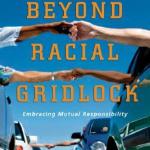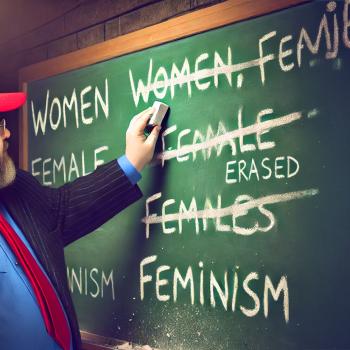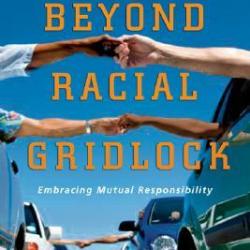Watching a country tear itself apart is quite a spectacle. This is the cycle I have come to expect when we have a national racial incident. We have the racial incident, the protest and the backlash. Is it a cycle that we can break? Not if we keep doing what we have done before. So here is my attempt to move away from that cycle and to encourage us to think about a mutual accountability approach.
Many of those who want to take action rely on a philosophy of antiracism. Today much of this philosophy has been promoted by a book that has been number 1 on the NYT bestsellers list – White Fragility by Robin DiAngelo. I will use this to represent the ideas behind much of what has been called anti-racism. I do not judge the intentions of those who pursue this approach to race relations. But I do assess the effects of this approach. And I believe that the effects will perpetuate our society’s continual cycle of racial incident, protest, backlash and then normalcy. While my criticisms of DiAngelo’s approach may not apply exactly to the work of other popular anti-racist work such as those penned by authors such as Ibram X. Kendi, Ta-Nehisi Coats, and Reni Eddo-Lodge but most of it will be on point for those anti-racism books as well.
The rise of White Fragility has obviously made it the most popular antiracist book out there right now. DiAngelo’s basic thesis is that whites have been greatly socialized to have “a deeply internalized sense of superiority and entitlement.” In essence all whites are racist. Not racist in the sense that they want to burn crosses, but they are complicit in the internalized racism in our society. The denial they engage in becomes the white fragility that is the title of the book. It is the stress they feel when their worldview, upon which they have built an understanding of society that serves them so well, is challenged. That defensiveness and the need of whites to assert their innocence of the charges of racism is what DiAngelo says we have to break down if we are going to move away from a white dominated society. To be sure this is not a complete description of her argument, but just some key points that I believe to be relevant for this conversation.
Okay I believe in institutional racism. I believe that many whites would prefer to deny the existence of such racism. I believe that many whites are defensive and do not want to confront the reality of our racist past and the current manifestations of that past. To this end some of DiAngelo’s statements I support.
So where does she get off the track for me? Well first, and as a scientist foremost, she provides precious little empirical work to support her assertions. The work on implicit bias is questionable at best. The implicit bias test that is so often used does not appear to be a good way to measure prejudice. Implicit bias may be real but it does not appear to be a major factor in why people discriminate against each other. Another empirical problem is that if the defensiveness of whites is somehow unique to whites then where is the research making cross racial comparisons indicating this unique “fragility” of whites? I would think that if this is a unique phenomenon among the majority group that we would have some data demonstrating this to be the case.
And perhaps even more frustrating how can white fragility be operationalized so that we can test for it? As far as I can tell the only way a white person can react and not be guilty of white fragility is to agree that he or she is a racist and then do whatever the person of color asks him or her to do. Any defensiveness, crying, arguments, requests for evidence of racism or any other reaction is taken as evidence of white fragility. It is the ultimate in heads I win, tails you lose rhetoric that is great for a facebook argument, but not useful as far as the creation of a conceptual tool that you can use for hypothesis testing.
Well if DiAngelo’s book is light on solid conceptual empirical support what about empirical results by those who use such anti-racism techniques? Not good news on that front either. The type of diversity training that emerges from these efforts has been shown to have little long term effect on prejudice. Furthermore a focus on privilege can actually decrease sympathy for poor whites while not raising the overall sympathy for blacks. Research seems to indicate that taking the route of DiAngelo is not lessening our racial hostility but it may be making that hostility worse.
It is not hard to see why this may be the case. Whites who are told that their only option to avoid being insulted is to just comply with people of color are not likely to be open to correction. Some may feel obligated to comply but those that do not can easily build up resentment to the tactics of the antiracists. They quickly learn that they cannot openly criticize the antiracists so their resentment will find other outlets.
Let’s be honest. The concept of white fragility is an academic way to tell whites to just shut up and obey. It is not an attempt to tell whites that they need to let people of color speak. Rather it is a way to tell whites that only people of color should be allowed to speak. Some whites are so desirous to confront racism that they accept the terms of this “deal.” But many whites will naturally not accept it. Bottling up the expressions of whites is not the path towards addressing the racial alienation that troubles our society. Rather it is the path to guarantee that efforts to deal with the historical and contemporary effects of racism will have a strong constituency that will fight against it.
And beyond these dynamics that inhibit the ability of white fragility to create sustainable solutions there are also the factual errors in DiAngelo’s work which are quite telling. For example, on page 31 in her book she is trying to make the point that whites dominate all of our institutions. So she points out that in 2016-2017 that the president and vice president were 100 percent white. Problem with that is that the president throughout the entire year of 2016 was Barak Obama. Trump did not officially become president until 2017. In fact, since he was president for about 20 days in 2017, it is fair to say that Obama was president for more time in 2016/2017 than Trump. Normally I hate this kind of nitpicking but I suspect that this is not just being sloppy. This is the type of error a scholar makes when she only sees her theory and not alternative perspectives. I suspect that DiAngelo is so intent upon emphasizing the responsibility of whites that she ignores the eight year presidency of Obama. When she gets obvious facts like this wrong, then it is reasonable for readers to wonder what other exaggerations she has been making.
Case in point is her treatment of Jackie Robinson. She argues that there is a subtext about Robinson being the first black who was seen as good enough to play baseball rather than being the first one allowed to play baseball. I do not know where she gets that interpretation. No serious baseball fan thinks that there were not blacks before Robinson who could have made the majors. It is a common argument about baseball fans about how good are the records of icons such as Ruth and Wagner because they did not have to face players from the Negro Baseball league. Claims such as this one without any real documentation really call into question the quality of scholarship DiAngelo brings to her work.
Now I am clearly not the first one to bring such criticism of DiAngelo’s work out into the open. Several others have also pointed out these flaws (see here, here, here, here, here and here). But what I might offer that these other individuals don’t is that I have an alternative to DiAngelo. I have a different approach supported by previous empirical work and one I believe is better suited to bring us together. That approach is what I call the Mutual Accountability Approach.
I outlined this approach in a Christian book and an academic book. My initial thinking of this approach was inspired by certain values I picked up from my faith but I found those values substantiated in sociological research. I know my blog attracts many non-Christians so for the balance of this blog I will rely more on the principles found in my academic presentation of this model rather than using religious justification. But if there are Christians who find it easier to accept such solutions if they are grounded in scriptural principles, then I invite them to check out my Christian book on the subject.
It is well established that we have a racial history where whites have abused people of color and that history has resulted in a contemporary system where people of color are at a disadvantage. We need to move from these racialized institutions that work better for majority group members to systems that are fair for everybody. But sociological theories of group interest (The discussion of this theory in Katz and Taylor’s book Eliminating Racism is quite good) get in the way of us doing this. We will favor institutional systems that help our group even at the expense of other groups. Indeed, the solutions we push may not be what is best for the entire society but as long as they meet our needs those are the solutions we will push.
For whites, given that the status quo works to their advantage, it makes sense that their solution to our racial struggles is to focus on ignoring racial problems. Indeed, for many whites, unless we are looking at a situation of overt racism, they tend to argue that our problem is that we pay too much attention to racism. The anti-racism crowd are spot on when they point this out. But what they miss is that group interest not only affects whites but it also affects people of color. People of color in their zeal to correct racial problems can also go too far and set up unfair conditions for whites. Group interest theory indicates that allowing either group total control of what we are going to do means that this group will create rules that benefit them but put others at a disadvantage.
Let me put it this way. Given what group interest theory tells me as an African-American I should not feel comfortable living in a society where whites have the final say in how our race relations will be conducted. But it is fair to say the reverse as well. Given the implications of group interest theory it is reasonable for a white person to not feel comfortable with African-Americans having complete power either. Indeed, one of the problems of the theory of white fragility and antiracism is that there is an implicit assumption that whites can rely on people of color not to abuse the new authority granted to them. Such an assumption goes against the grain of group interest theory which would predict that people of color will use any power they gain to better themselves more than the general society.
So how do we get past this barrier of mistrust? How do we find a solution that serves everyone, and not just our chosen group. It is both simple and devastatingly difficult; my solution is that we all have the responsibility to communicate and listen to one another. We have to work with each other to find win-win solutions instead of relying on win-lose scenarios. I need to hear from whites about the concerns and they have to listen to me about mine. Only then can we work towards fashioning solutions to the racialized problems in our society that can serve all of us well.
I know that some are not in the mood for compromise and working with others. They may calculate that they can win the fight and get what they want. Okay then what? If you take what you want from others, they do not just go away. They will fight against you with all that they have until the reforms or revolutions you have inspired have failed. The backlash will come because those who disagree with the social changes you implement have no investment in making those changes work.
Is there research indicating that working together can help us deal with racial alienation? Empirical work suggests that a theory known as the contact hypothesis may offer us answers. It basically states that under the right conditions intergroup contact produces more tolerance and less prejudice. While I do not want to go into all of the conditions necessary, there is research indicating that when we have an overarching identity with those we are in contact with that we move from seeing them as foreigners to seeing them as part of our group. At that point our biases towards former outgroup members tend to become dramatically reduced.
Rather than trying to figure out how to make sure our group wins everything it can get, we have to do something difficult. We must find common ground and do what we can so that we all can win. This very process can bring us together and reduce the racial animosity that never seems to go away in our society. But it will be hard work. We will not easily give up the idea that we can get everything we want or that we are right but those who disagree with us have no clue. But if we can overcome these tendencies and learn how to fashion win-win solutions, then we have a chance to move forward.
These are the principles that underlie the mutual responsibility model. It is a model that came to me as I conducted research on multiracial churches and interracial marriages. Religious institutions and marriages are two areas where the conditions of positive interracial contact can be met. From that research I begin to argue that interracial contact, done correctly, is a vital element for producing positive racial change in our society. In fact, I do not see how we will adequately deal with racial alienation until we have interacted with each other in healthier ways. That is not to say that positive contact alone is all we need but until we, across the racial spectrum, are willing to work with each other on ideas that go beyond serving the interest of our own racial, and at times political, tribe then we will not make any further progress in race relations.
I do not have the space to explore all the implications of mutual accountability or to completely discuss how we to achieve all it has to offer. I have written two books on it and I invite you to read them for a more in-depth treatment. But I do want to focus on one essential aspect in this process which I think will provide us a flavor of what we have to do and how hard it will be to do it. That aspect is the skill of active listening. Without active listening we have no chance to succeed in learning how to communicate with each other.
I use active listening whenever I interview research subjects or conduct focus groups. Active listening is listening for understanding and not argument (To be sure antiracists do push active listening but they only expect that from whites). So often when we try to discuss a controversial issue we listen so that we can make the strongest counterargument against the speaker. There is a time and place for that but to overcome our tribalistic instincts we have to temporarily suppress that impulse if we want to take the responsibility of building win win solutions. Active listening is an important way to do this since with active listening, we are not trying to win an argument but rather we are attempting to understand the other person’s perspective.
So how do we actively listen? The key to whether we have truly actively listened is whether we can put the attitudes and perceptions of the person we are speaking to in our own words but also in a way where they agree with what we are saying. For example, in my research on atheists, I interviewed about two dozen atheists. I am not an atheist. But when I heard my respondents make a point about their negative perceptions about religion, I made it a practice to provide them with my interpretation of their statement and to correct me if I am wrong. I did not want my theistic beliefs to interfere with my ability to understand my atheist respondents and so I try, imperfectly, to put myself in their shoes so that I can better understand them. We are going to have to make similar efforts to understand one another if we really want to make progress in racial issues.
What that means is that the way to respond to racialized problems is to have individuals representing the interests of the racial groups deeply involved and to listen to each other not for argument but for understanding. At that point we have a chance to fashion solutions that serve everybody.
I have been talking about active listening and trying to find win win solutions for years now. Sometimes I am talking with whites who are wondering what all of the fuss is about. They want us to just start ignoring racial issues assuming that if we do so, then magically racial issues will go away. Some of them question the existence of institutional racism and see it as merely a way people of color trying to induce guilt on whites. I have tried to explain to many of them that we cannot simply ignore racial issues and hope they go away and they look at me as if I am the problem. If people like me just shut up and concentrate on treating all people the same then we will have a better society. For some of them I am the real racist. So I have had my share of frustration dealing with whites who do not take seriously the problems of racism in our society.
But this is not the case with all whites that I talk with. Some of them do understand that we cannot simply wish racial inequality away and that we must find ways to mend our broken race relations. Some of them want to engage in the type of conversations that can lead to real solutions. Why does this happen? I do not think I have any special abilities. I think I simply have learned how to listen to my white friends to hear where their concerns are. I have learned how to talk to them in ways they can hear me. So those who are open to addressing racial issues can be reached even as some whites remain stubborn in refusing to deal with racial alienation in our society.
But I must admit that as hard as it has been to deal with whites who do not want to listen to people of color that I have had a harder time reaching people of color. It may be that for many of them that this is the first time they have felt real cultural power in our society. It seems that people are listening to them and they can get a good deal of what they want. It can be hard to give up that sort of power and influence. The temptation to hold on to such legitimacy which has been denied to people of color for so long can be quite strong. I fear such temptation blinds some of them to the reality that this moment of racial unrest is similar to what happened after Michael Brown, Freddie Gray, and Trayvon Martin with the pattern of racial incident, protest, backlash and then a return back to “normalcy.” We are doing the same thing over again and hoping for a new result. That is the definition of insanity.
So I anticipate that some people of color will object most strongly to my mutual accountability approach. Why should they listen to whites? That is not fair after the centuries of racial abuse they have suffered at the hands of European Americans. Why can’t whites just listen to them and accommodate them after these centuries of abuse? I am demanding too much from them.
To some degree they are right. It is not completely fair. We people of color have suffered more in our exchange with whites than vice versa. I completely understand the emotional need for some people of color to pull away from conversation and to rely on making demands. Hey I feel that way sometimes myself when I have to explain for the fiftieth time why I call Trump a race-baiter; knowing that after I show my white friend videos like this one that they still will deny the racism Trump placates.
So I am not going to make an emotional appeal but a rational one. Simply if you rely merely on accusation, blaming and canceling to compel whites to support you, we will get what we have gotten thus far. Some whites will respond to that. Others will engage in a backlash. Others will simply ignore us. I run into plenty of whites who are not insensitive to the plight of people of color, but have been called racist one time too many and now want nothing to do with anything antiracists or with ideas such as white fragility. Ironically sometimes I run into these whites after they have read some of my work and are willing to work on race relations again because of my work. It is not that I am magical or anything like that. It is that when I write or speak, I do so from having listened to whites and thus have knowledge on how to reach them.
Let me put it this way. This is the choice that reality has provided people of color. We might get nearly 100 percent of what we want but it will be temporary. Because the backlash against us means that about half the population will work to sabotage whatever solution we get implemented. Or we can get 70-80 percent of what we want though active listening and working with other people who will help, instead of hinder, us. So that 70-80 percent we receive is sustainable as we pull together as a group across racial and ideological lines. The practical smart play is to engage in active listening to work out win win solutions if what we want is long term success.
If you are still not convinced that working for win win solutions is the best approach, then let me frame this one final way. Think about the whites who want to figure out how to deal with our racial conflict but are not comfortable with just being told to shut up. They are open to learning about institutional racism but not open to not having a say in how to deal with it. So their choice is an anti-racism program where they have no say in the process or to just ignore racism altogether. My experience is that many of them will try to go the anti-racism route for a while but will be called a racist or be asked to turn a blind eye to a person of color misusing his or her cultural power and eventually gave up. Then that person will still be concerned about racial issues but will not accept a “white fragility” path towards a solution.
Will that person move towards ignoring racial issues? That is a possibility. Most likely though that person will not have a solid way to deal with his or her concern about racial alienation or racism. They will probably be paralyzed not trusting the rhetoric heard by anti-racism activists but wanting to do something. I know because I have met these people and heard their stories. Some activists may say that we should just forget about them. If they cannot get with the program. then they can just go pound sand. But, if we cannot give them a way to deal with their desire to confront racial alienation then we can lose them as possible supporters forever.
We need solution that pull us together, not drive us apart. That is the only way we will have sustainable pathways away from the racial alienation poisoning our society. We do not need to engage in more recrimination and name calling. Victories gained by those techniques will face constant challenge and keep our society in turmoil. The way forward is to move forward together.
To summarize, in contrary to the questionable research surrounding White Fragility, research suggests that a common identity and fruitful interracial contact can reduce prejudice. My work indicates that interracial couples and multiracial churches have found ways to solve racial problems with respect and understanding those in other races. Conceptually the mutual accountability approach is more likely to produce unity across racial and ideological groups since it does not force anyone to totally ignore their own group interest – just compromise a bit on them. I choose to head in a direction with empirical support and that is tied to bringing us together. Doing this will be hard. Extremely hard. But why should we be surprised at that? Usually the things worth having are hard.















